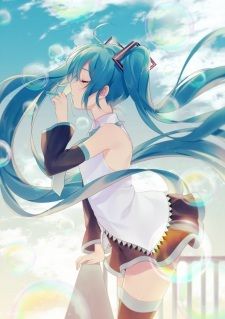|
If you liked
Isekai wa Smartphone to Tomo ni.
|
...then you might like
Gacha wo Mawashite Nakama wo Fuyasu: Saikyou no Bishoujo Gundan wo Tsukuriagero the Comic
|
Both are Isekai harem adventure stories with a similar setting. Both are using smartphones as an inmportant item. In 'Gacha wo Mawashite' the MC seems not overpowered compared to his companions, while in 'Isekai wa Smartphone' the MC not interested about him being overpowered. 'Isekai wa Smartphone' is a bit more interested about politics and world structure while 'Gacha wo Mawashite' still is introducing its party.
|
If you liked
Gacha wo Mawashite Nakama wo Fuyasu: Saikyou no Bishoujo Gundan wo Tsukuriagero the Comic
|
...then you might like
Maou ni Natta node, Dungeon Tsukutte Jingai Musume to Honobono suru
|
Both are your average Isekai with its harem and overpowered MC tropes. Nothing special. If you like this kind of mangas, you will probable like both of them. Both are centered around a modern japanese MC that uses some of its knowledge from Japan in the new world. As the story continues the harem component in both increases. Everything else around the story and setting feels very generic and average and both do not manage to build up an unique seeting in the beginning. This might change in later chapters, but since both are not advanced enough they often resolve around similar story arcs.
|
If you liked
Doujin Work
|
...then you might like
Eromanga-sensei
|
Both are similar in their depiction of a group of friends that is involved in the creation of manga/ln. 'Douijin work' is more concerned with the details of the doujin market and the expectations of its fans. 'Eromanga-sensei' is more concerned about the relationship of the main protagonists. Both feel similar in that they are taking a lighthearted and relaxed approach towards the environment of ln/manga creation and and in their reliance on comedic interactions between characters.
|
If you liked
Mangaka-san to Assistant-san to
|
...then you might like
Eromanga-sensei
|
Both are focused on producing ln/manga with an assistant. While 'mangaka-san' is more focused on the conditions of a professionel mangaka and his connections with his staff, 'eromanga' involves more of personal relationship between brother and sister and is less concerned about the working environment. Both feel similar in their lighthearted approach. In both publishing difficulties and finding personal motivation for their jobs are taking up some story arcs. If you liked 'eromanga-sensei' for its relaxed approach on producing ln and manga and also liked the cast of characters you might like 'mangaka-san'.
|
If you liked
Only Sense Online
|
...then you might like
Itai no wa Iya nanode Bougyoryoku ni Kyokufuri Shitai to Omoimasu.
|
Very similar in its core setting and peaceful approach. Only Sense is similar to Bofuri since both are centered around an unusual playstyle in an MMO. In Only sense Shun chooses strange combinations of support skills to make new items other players did not think of. In Bofuri the MC combines her skills in a special fashion during battles. Because of that it is possible for both to compete with more traditional characters under certain conditions. Both also have the same lighthearted and peaceful approach where many scenes are centered around comedic and slow-paced slice of life scenes. Biggest difference between both is that Only Sense centeres around crafting and gathering while Bofuri centeres around adventure and progression.
|
If you liked
Doujin Work
|
...then you might like
Mangaka-san to Assistant-san to
|
Both are based on the daily lifes of friends that draw manga. While in Mangaka-san it is centred around a professional mangaka in doujin work it is based on less known artists. In mangaka-san it is therefore more centred around the difficulties of a professional mangaka with his staff and editors and in doujin work more around the special circumstances of doujins. Both are very similar in style.








